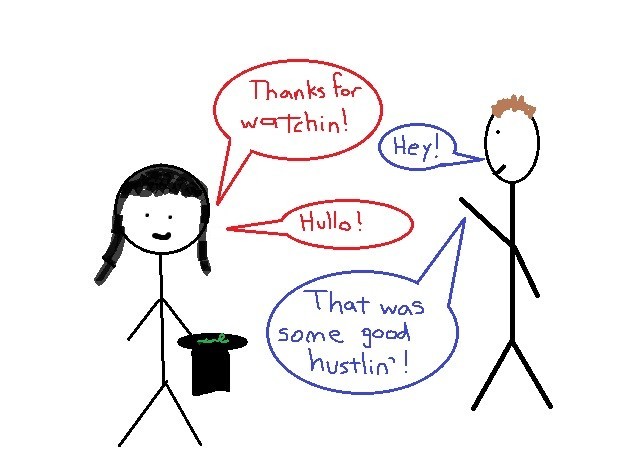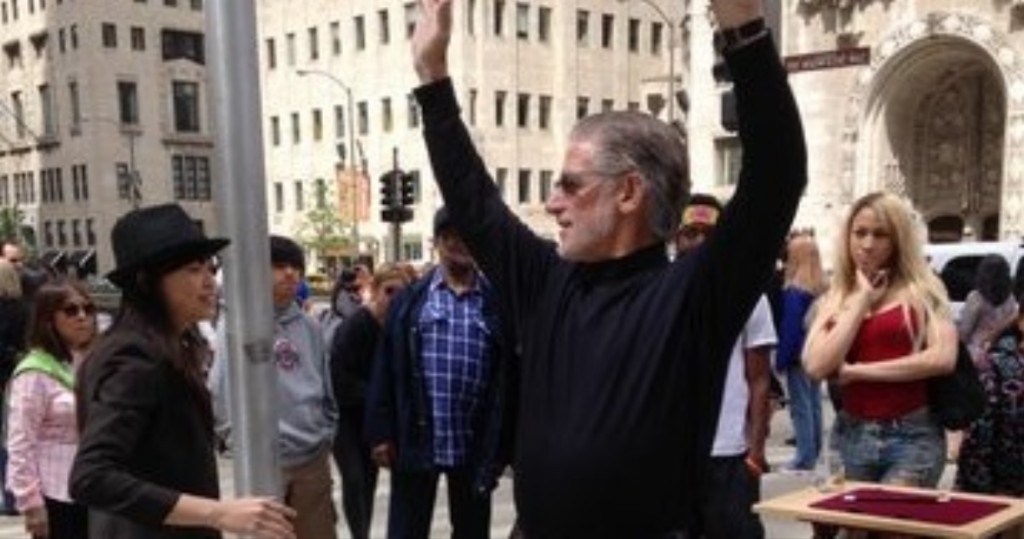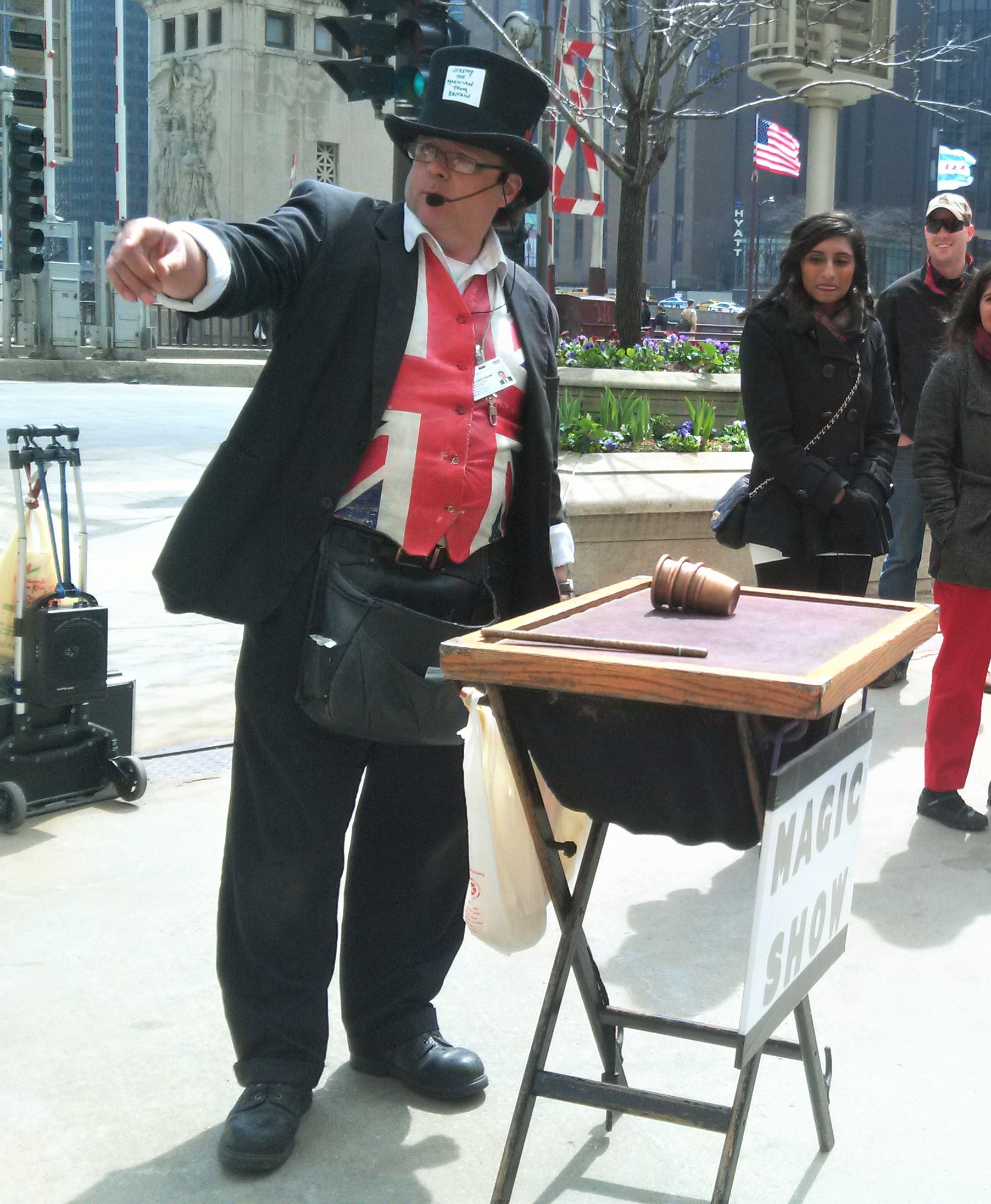
What does it mean to “hustle”?
Back when I was still living in Chicago, I had finished several shows when a panhandler approached me with what seemed to be congratulatory: “That was some good hustlin’! That was some good hustlin’!” I remember feeling thoroughly confused.
Hustling.
Is street performance hustling?
And if that’s the case, is it good or bad?
Another street performer whose reaction seemed to mirror mine shrugged when I asked him the question. “All of this is technically a hustle, I guess.” By “this,” he meant everything from street performing to panhandling to shining a pedestrian’s shoes for cash. He went on to explain, “I don’t think that’s fair. I regard what I do as work.”
This slightly negative understanding of the hustle comes from the word’s relationship with the way that it is used “in the black community.” The 10 Man, a Chicago street performer, attempted to clarify the concept for me:
“In the black community, when we talk about hustling, or a lot of them, when they talk about hustling, a lot of them talk about doing their own job, maybe selling drugs. That’s why they call it hustling. They be like, naw, naw. I get off at the gig at like 8:30 and then I’mma start hustling. Ya know, a hustle is something that you do on your own. It’s not like a job. It’s your hustle. Something you do on your own, completely independent of anybody else.”

The negative connotations of the hustle are a result of its close association with “selling drugs” and other such illicit activities. However, the key here is in the distinction that the 10 Man makes between a conventional job and a hustle.
“When you’re working a job,” he argued, “you’re working somebody else’s hustle.” He continued:
“They [someone with a conventional job] might get $9 or $10 an hour but after insurance and Uncle Sam and everybody, they’re getting hustled, ya know? It’s Sam Walton’s hustle, not their hustle. If I wake up in the morning and it costs $10 to get to work, as far as gas, and I might pay another $15 for parking. And I pay another $5 for food. That’s $30 bucks I paid to get to work. But if I come home with a few hundred dollars, that’s my hustle. You know what I’m saying? I just hustled. It didn’t cost me nothing to make this money. That’s what a hustle is.”
In this sense, Sam Walton, founder of Walmart, is a hustler. The boss of any company has a hustle. Freelancers of any kind are also hustlers. Indeed, 10 Man’s explanation of the word ultimately signifies ownership: For him, to hustle is to have ownership over his labor.
So – let’s shed any negative connotations tied to the word ‘hustle,’ and think over what that definition means.

The significance that street performers place on “ownership,” especially in comparisons of busking with other jobs makes clear how rare such ownership is. The 10 Man’s pride in his work comes, in a sense, from almost ‘beating the system’ and, through busking, escaping the need to work at an unfulfilling job.
Thinking back to his decision to become a full-time street performer, 10 Man reflected, “My first day was so profitable, I quit my job, I quit college, I moved out of my parent’s house. And that… that was in ’03. 2003. So, uh, I’ve been performing, street performing about ten years now.” For a young college student who was working for a life insurance company, busking was more profitable than his job at the time, seemingly had better prospects than what a bachelor’s degree could give him (though he’s gotten his BA in Fine Arts since), and, in effect, granted him the financial independence that he had not yet found in more conventional paths.
Another individual also spoke explicitly of how he actually left a low-paying job to become a street performer: “I got a job working at Macy’s and it sucked. Working for $8.25 an hour. I couldn’t do it. I could, I enjoyed it, but I didn’t enjoy it as much as performing. So I’m a performer. It’s what I do. […] I like my freedom, so that’s basically it.”
This kind of pride, however, exists because of a socioeconomic context in which regular employment means “$9 or $10 dollars an hour” and – more importantly – where the average worker couldn’t care less about the thing that she’s selling.
Jeremy, a Chicago-based street performer who goes by the stage name “Magician from Britain” (his past jobs included one in which he taught at a high school, sold insurance, worked at a Catholic church, and baked), started to work as a street performer during a period of unemployment when alternatives were few. He summed up his work history in a conversation: “And here I am. That was in May. Like, May 6th, I think. 2011. And here we are, 2014, and now it’s my full time gig.”

However, though unemployment may have led to his decision to start busking, something else contributed to his decision to remain a street performer. After all, he described street performing as “the best job” he’s ever had:
“And I think too that they all [family and friends] realize that of all the jobs that I’ve had in the past, this is actually the one that fits me best, you know? And this certainly is the best job I’ve had. I’ve never enjoyed working as much as I have doing this. And I’ll, you know, as I said earlier, I’ll work long hours, but it’s not a burden to me. But if you stuck me in a law firm and asked me to work for twelve hours non-stop, that would be bad.”
Even something as socially prestigious as working “in a law firm” does not compare to the satisfaction possible in having ownership over one’s labor and doing something that “fits” him best.
In a context where wage labor (doing “somebody else’s hustle” or doing “Sam Walton’s hustle”) is the norm, street performance is an example of a kind of work where the laborer is not alienated from the product of her labor. Street performance therefore has a unique kind of value for the street performers who make a living out of busking.
So while there may be various interpretations of the word “hustle,” the meaning that the 10 Man attempts to communicate through the term is ultimately one that most street performers (at least the ones with whom I have spoken) seem to identify with:
Street performing is “work,” and – more importantly – street performing is one’s own work. Ownership is significant. The ability to labor, identify that labor as clearly one’s own, and thereby “profit” from that labor is, at its heart, what street performing is all about.